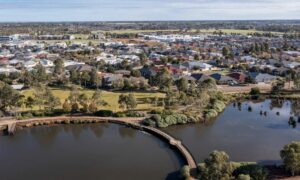Words by Andrew Spence. Photo by Liam West
Mollydooker Wines owner and CEO Sarah Marquis spent South Australia’s March vintage in isolation as she recovered from COVID-19 and watched the company’s US distribution grind to a halt. But despite the setbacks Marquis is upbeat about the future and is using the downtime to reposition the business to grow online sales and revitalise its cellar door offering.
Marquis was hosting a skiing trip in Colorado for Mollydooker’s top US distributors when COVID-19 closed the mountain in mid-March. She arrived back in South Australia on March 17 and immediately went into self-isolation before testing positive a week later and enduring mild headaches and nausea for about five days.
“We were just starting vintage and I had to self-isolate for two weeks with my partner and then I had to self-isolate for another 14 days to make sure I no longer had any symptoms,” Marquis said.
“As soon as I said I had COVID-19, the (winery) team got even more serious about wiping down surfaces and they are still doing it at the end of every day and half of our staff are still working from home.
“The head winemaker and the head viticulturist have been doing it for 15 years and knew exactly what to do so we could keep running and it was fine with me not being there, I just worked from isolation and made a lot of phone calls.
“My expertise as a winemaker comes in with the blending and the decision and the style making, which happens a bit later.”
The Mollydooker cellar door in the McLaren Vale wine region of South Australia has been closed since March 18 but the shutdown has coincided with a 30 per cent off online sale in Australia and the US, which Marquis said had more than offset the loss of cellar door sales.
She said the four-fold increase in online sales had been vital for maintaining some cash flow and had opened up new revenue opportunities in Australia and overseas.
Mollydooker Wines, which takes its name from an old Australian slang word for a left-handed person, was started by Marquis and her former husband Sparky in 2005, selling about 30,000 cases of McLaren Vale wine exclusively in the US in its first year.
The company produced 90,000 cases in 2019 and now sells about 50 per cent in the US, 25 per cent in Australia and 25 per cent in other countries including South Korea, Denmark, Germany and Canada.
About 98 per cent of Mollydooker’s wine is red with Shiraz and Shiraz blends making up about 80 per cent of production. It is also known for its colourful names, velvet labels and its quirky “Mollydooker Shake” wine serving method.
Dry conditions and a cool spring led to a much smaller than average vintage across South Australia this year with Mollydooker on track to produce just 55,000 cases from the 2020 crop. About a third of the winery’s grapes are estate grown while the remainder are sourced from McLaren Vale and nearby Langhorne Creek.
The McLaren Vale wine region is about 40km south of the South Australian capital Adelaide and is renowned for its red wines, particularly Shiraz and Grenache.
Although yields were down in McLaren Vale this year, the quality of the vintage is high as the region escaped any ill affects from bushfires that ravaged several wine growing areas of Australia.

Marquis said the current dip in sales meant the small vintage came at the ideal time. However, she acknowledges that many wineries were possibly not as well placed to cope with a downturn, particularly those that relied heavily on cellar door and sales to hotels and restaurants.
Rising tensions between Australia and China, its biggest wine customer, is also putting pressure on wine companies heavily reliant on Chinese orders.
“Just the way our business is set up, we’re not reliant on China, online sales have gone very well and with a small vintage coming up is also great so if there’s a little lag it’s kind of good because we’ve got less coming out in a year and a half,” the left-handed Marquis said.
“In the 2016 and ’17 vintages we had 96,000 and 90,000 cases, which was up from 75,000 and we haven’t quite got through all of that yet but now with the smaller vintage coming it’s perfect.”
Marquis studied winemaking at the University of Adelaide Viticulture and Oenology faculty alongside the likes of Peter Gago and Stephen Pannell in the late 1980s before working at Fox Creek in McLaren Vale, which was started by her parents Helen and Jim Watts in 1984.
Sarah and Sparky began making wine for the US market under the Marquis Philips label in the early 2000s in partnership with US wine importer Dan Philips. But the relationship soured after a few years, leading to the launch of Mollydooker.
Marquis and Sparky went their separate ways in 2015 with Sarah taking sole ownership of Mollydooker Wines in 2017.
The company has won many wine accolades over the years and was most recently named 2019 Telstra South Australian Business of the Year.
Mollydooker has its own importing company in the US and two permanent staff members as well as Sarah’s son Luke, who heads up the winery’s US distribution. About 70 per cent of its US distribution is through retail outlets including Costco and Trader Joe’s while the remainder is to restaurants and other on-premise customers. Its wines are sold in 48 states with California and Texas the biggest buyers.
However, Marquis said the recent surge of online sales in the US had been a “saving grace” and pointed to further opportunities to grow direct to consumer sales in the future.
She said the import business was the key to Mollydooker’s long run of success in the US as it allowed the company to increase its margins and maintain control of its wine for longer.
“In the US they think of Southpaw and the idea that Mollydooker is Aussie for left-hander and they love the accent and the story.
“A lot of Australian wineries were in the US and then when the GFC hit and the exchange rate was bad many pulled out because they weren’t making any money but we stayed in there because we owned the import business, which allowed us to make a little bit more margin than most other wineries and that means our product also ends up at a really good price point.
“When the exchange rate was at $1.10 in 2011 and 2012 that did hurt us but we stayed in the market along with only a few others such as Penfolds, Yellow Tail, Henschke and Two Hands and right now with the exchange rate we’re making almost double.”
The United States is the second largest importer of Australian wine but sales have slowed in the past two months as the nation attempts to recover from the COVID-19 pandemic.
“When COVID hit, the US just stopped ordering and our sales slumped 60 per cent there last month but the increase in online sales has helped,” Marquis said
“We’ve still got the wine in bottle and we can still sell it once we get through COVID so I’m not too worried – it’s not like it’s perishable and we’ve got to sell it now.
“We are expecting our distributors to order large quantities once the tension in the market dies down, as they will need to refill their warehouses and stock.
“So far this May, we have seen a busier selling month from distributors into restaurants and retailers that have remained open compared to last year, so we are hoping this continues.”
However, Marquis said she was relieved Mollydooker had reduced its reliance on the US in recent years.
“I’m glad I’ve spread the risk now as our sales to the rest of the world has picked up.
“The rest of the world markets, which is about 25 per cent of our volume, they all bought like crazy last month, which was a surprise.
“South Korea is a great market and we sell about 5000 cases a year to Denmark and also into Canada.”
Back home, Mollydooker has 50 staff and Marquis is thinking about how to reinvent the cellar door experience with a possible re-opening next month.
“I like the time to reflect at the moment and reinvent the business and a lot of people should be doing it because things will change and we just need to be flexible.
“I’m really looking at the business including the profit and loss and the operating costs of the cellar door and I want to re-open with a new offering that’s not just a free-for-all tasting.
“We want to do proper cellar door packages from a full velvet experience including a winery tour and private tasting through to a fun $10 tasting where you taste nine wines and get to keep your glass.
“Maybe next month if we do open we might do it by appointment only on the weekends so we will limit our numbers and keep it safe and then when everything goes back to normal we’ll offer a couple of different experiences.”





















